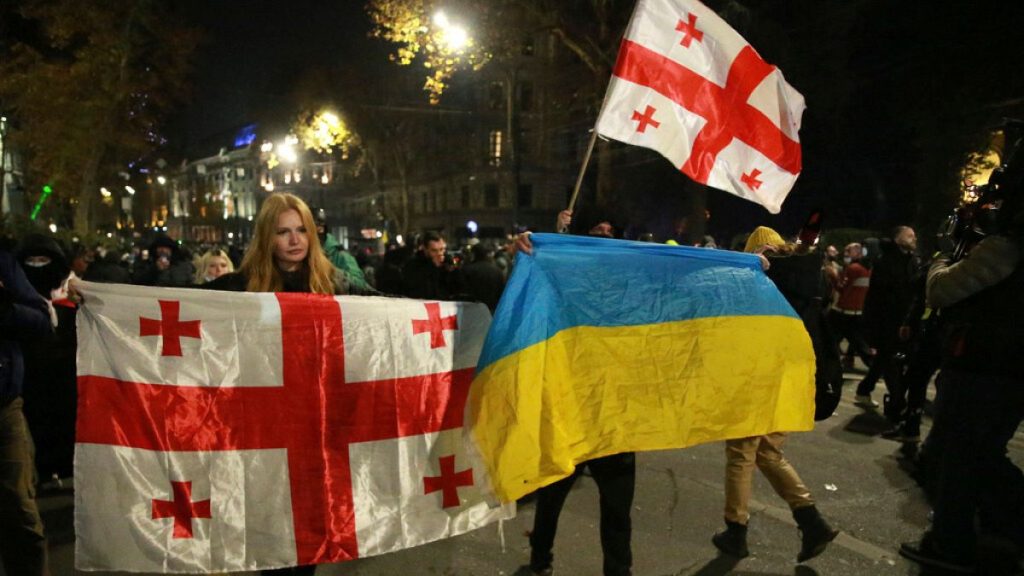Ukrainian President Volodymyr Zelenskyy has raised alarms about the increasing influence Russia has over Georgia, accusing the ruling Georgian Dream party of steering the nation into a state of dependence on the Kremlin. In a decisive move, Zelenskyy announced sanctions against a prominent figure in the Georgian Dream party, Bidzina Ivanishvili, along with 18 others he identified as “accomplices.” His statement underscored a broader sentiment of solidarity within the region, emphasizing the importance of maintaining close ties with neighboring countries like Moldova and Georgia amid rising geopolitical tension. This latest development is indicative of a significant pivot in Ukraine’s approach towards Georgia, highlighting concerns over Russian interference in the political affairs of its neighbors.
The backdrop to Zelenskyy’s sanctions stems from escalating unrest in Georgia, fueled by the government’s recent decision to halt negotiations on joining the European Union. In the wake of this political turmoil, the Coalition for Change, a key opposition party, experienced a severe crackdown. Police raided their offices, detaining their leader, Nika Gvaramia, while simultaneously targeting other opposition groups and non-governmental organizations. This assault on political dissent has revealed a troubling trend in Georgian politics, as the ruling party appears to be resorting to authoritarian measures to suppress dissent. The timing of the crackdown coincides with growing public dissatisfaction manifesting through protests, with demonstrators clashing with law enforcement in the capital city of Tbilisi.
In the face of these daunting challenges, mass protests erupted, drawing hundreds into the streets of Tbilisi. The government’s response, involving riot police deploying water cannons and tear gas, has led to significant confrontations, with over 300 protesters reportedly detained and more than 100 requiring medical treatment for injuries. As frustration with the government mounts, the political climate in Georgia is increasingly fraught. The situation is further complicated by the upcoming presidential elections scheduled for December 14, where the outgoing president, Salome Zourabichvili, has criticized the ruling party’s legitimacy, signaling deep divisions within the political landscape.
The EU’s decision to suspend Georgia’s application process for membership represents a major setback for the country, which had been seeking closer ties with Europe. This halt followed the passage of a controversial law in June that mandates organizations receiving more than 20% of their funding from abroad to register as entities pursuing foreign interests. Critics have likened this legislation to a Russian law aimed at silencing voices that challenge government authority. This troubling development has heightened fears of Georgia’s political trajectory aligning more closely with Moscow’s interests, and further underscores the delicate balancing act that the Georgian Dream party must navigate between the pressures of their constituents and the allure of Russian support.
Zelenskyy, in his remarks about the situation, made it clear that Ukraine views the stability and direction of Georgia as integral to regional security. Historical contexts give weight to these assertions, as both Ukraine and Georgia share mutual concerns over Russia’s expansionist policies following events like the annexation of Crimea and the ongoing conflicts in Eastern Ukraine. As Kyiv seeks to bolster alliances with other countries that emphasize democracy and sovereignty, the message of solidarity becomes crucial in reinforcing the stance against Russian domination in the region.
The events unfolding in Georgia will likely resonate far beyond its borders, impacting not only its immediate political landscape but also shaping the strategies of neighboring nations grappling with similar dilemmas. The narrative of resistance against authoritarian tendencies will become a focal point for discussions about independence, democracy, and the enduring threats posed by autocratic regimes. In this delicate geopolitical environment, the implications of Georgia’s political choices drum up renewed attention and concern from both European and regional partners, who all seek to fortify their own democratic institutions against external pressures.














